|
It’s that time of year where students set off for college, some for the first time and some going far away from home. These students take on the challenge of continuing towards adulthood and the process of making their faith their own. This can be a difficult road filled with numerous temptations, stresses, and other challenges. As someone who attended Catholic school for most of my life, I found the transition to college difficult, especially when it came to my faith. I attended a large public university where few practiced Catholicism, and I felt very isolated. The people who I attended Mass with at the beginning of the year began to slowly drift away – going to other churches or becoming too busy with academic commitments. With my class schedule it was hard to make it to the Catholic Student Union events and join the camaraderie. While I adjusted well to college life, I felt alone in my faith. Everyone has different experiences when it comes to the transition into colleges. Whether you are entering college for the first time, a current student wanting to get more in tune with your faith, or even a parent or relative of a college student(s), I’ve compiled some tips about keeping up with your faith life that can be helpful: 1. Make friends who challenge you to be your best selfMake friends wherever you go on campus, but remain close friends with those who continually challenge you to be your best. Many of my closest friends at college weren’t Catholic, yet they held me to remain true to my faith and myself without peer pressure. Just as a spouse is to help his or her partner grow in faith, so too should your friends. 2. Get InvolvedWhether you join the Catholic Student Union or other groups on campus, make sure you are busy. Becoming involved lessens homesickness and other temptations. Enjoy your college experience! 3. Go to Mass every SundayMark it on your agenda. Make sticky notes. Do whatever you need to do so that you attend Mass each week. Experiencing Christ every week in the Eucharist renews us and gives us strength. Fortunately, as Catholics we usually have a variety of Mass times to attend, so take advantage of that! 4. Challenge yourself and set goalsRegularly make short-term and long-term goals, and then try to stick to them. These can be anything from attending adoration regularly, going to daily Mass, setting aside prayer or Bible-reading time, or even studying abroad, trying new foods, and accomplishing a certain academic achievement. 5. Find time every day to pray and appreciate the beauty around youDoing this helps strengthen your personal relationship with God. Plus, you gain a better appreciation for life and develop practices that will stay with you after college. It’s not easy, but it matters that you try. 6. Call your family and your close friends one or more times a weekThese people are important foundations in your life. Keep them updated on your life in college and be honest with them. Your family and friends are a support system when things aren’t easy. 7. Find a MentorYour mentor(s) can be an academic, club advisor, older student, or religious. These individuals in your life can help you navigate college, your future, and strengthen your faith. (Plus letters of recommendation and internship/job advice are certainly helpful!) 8. Talk to people at your local church and get involved in the Mass Become a part of your new parish community at college. Get to know others around you to have that “home away from home.” This will help you make good life-long friends. Plus, getting involved in the Mass helps you become ingrained in the community while deepening your faith. 9. Search for a church you feel most comfortable going toFeeling at home in your college parish is important. Find a church that makes you want to go to Mass. The nearest church may not be your favorite – so explore! My favorite parish in my college town was about 15 minutes away and felt just like my home parish. 10. Find people to go to church with you Having someone to go to church with incentivizes you to go to Mass. Plus, it’s always fun having a buddy. Keep each other accountable! Make it a group event and have brunch or dinner after Mass, too! *This post was originally published on September 8, 2014.
0 Comments
3/20/2020 In This Together: A Resource Guide for Families During Coronavirus Quarantine | COVID-19 ResourceRead NowTo all the parents home with their children, who are looking for creative, easy, or fun ways to spend the day, here are some great options to try for spiritual, mental, and physical health! Set a routine. It is important to establish consistency and keep kids on a structure like they are during a school day. For older children, have them collaborate with you as you create a schedule to allow for some influence on their day. It allows for predictability in the day, and children knowing what is expected of them is crucial to the well-being and peace of all in the family. Below is a schedule example. This can be used as a starting place for your family. Feel free to move things around or dedicate your time differently. What’s important is maintaining a routine that works for your family! Example:
Focus on gratitude. With many feeling anxious and having to deal with a lot that is so unknown, having a grateful heart can mean a world of difference for your well-being and that of your family. Have your child write thank-you-notes to mail carriers, restaurant workers, grocery store employees, and members of the family. Or, start the day by finding 3 things to be grateful for, then end the day like that too. Talk about this with your child and share your gratitude with them.
Prayer. There is nothing more powerful than prayer, and prayer as a family is crucial during this time at home together. Make time. Take time. Add it to a daily routine. In addition to saying prayers you may know by rote, consider reading the Daily Readings from USCCB to read the Word together in prayer. Play! For young children, older teens, and everyone in between, play is crucial. For older children that may mean down-time or free time to decompress, but for young children in elementary school this is so important for development. Playing together, but also playing independently helps support their creativity. As a parent, also take some time to think of ways you can “play”—not only with your children, but with your spouse or on your own. Make sure to come up with fun activities that are life-giving for you and your spouse: board games, a puzzle, baking, etc. Pretend and make believe. “Boredom breeds creativity” I was once told, and I couldn’t agree more! When children are given a chance to imagine and pretend away from distractions and technology they will think up all kinds of incredible things. As a parent, you may need to guide or inspire some pretend or make-believe with prompts or guidelines until your kids seem ready to take-off on their own. Even giving your child a difficult or challenging task and saying, “figure it out” may help for older kids who need to problem-solve. But here are some ways to get started:
Exercise. For children of all ages and adults too, exercise is so important. Although we must consider social distancing, getting outside and even just taking a walk is more crucial than ever as we are in our homes all day long. If you don’t have a yard to play in, try walking to the closest field or park to catch a ball or ride a bike around the neighborhood. If you cannot get outside, there is plenty to do inside. YouTube has workouts for children and adults, and there are workouts on Netflix and other streaming services to get you started. Write letters. This is a nice thing to do at all ages and levels of writing abilities, young ones can draw pictures and write what they can, while older kids could tell someone all about their latest adventure at home. Write to grandparents, relatives, elderly folks in nursing homes, neighbors, and friends from school who are also at home. It’s amazing how good someone may feel receiving a note or letter, knowing your child was thinking of them. Call someone, FaceTime, or video chat with someone. We are blessed in this digital age to have technology that can still keep us “together.” Calling friends, family, and loved ones, either on the phone or using a video chat application, maintains and strengthens our relationships with people we may not be able to see or visit right now. Read a book. Have your child help you create a booklist of 50 or 100 books and see how many they can read, then have a fun prize like baking cookies together or extra down-time be the reward. Activity pages made by teachers. For kids who are out of school altogether, look for materials online to keep kids up to speed on math skills, reading activities, and everything in between. With schools shut down, there is plenty out there to find! Make your own studying tools. Don’t forget that anyone (including the student) can make flash cards for addition, subtraction, multiplication, and division - as long as you have paper and something to write with! Some drills you could practice:
Fine motor development. Play with Play Doh (or make your own). Squeeze items with tweezers. Count and play with beads or buttons. Bake and roll out dough, ball up cookies, or knead pizza dough. We are living in unprecedented times which can add to the stress level of family life. We invite you during this pandemic to see this as a blessed time to rekindle relationships within your families and communities through prayer, play, and creativity and hope these resources will prove fruitful for you as we continue to navigate this time. Click here to visit our COVID-19 Resource Page Click Here to Download this Post as a PDF! Tyler and Emily Lomnitzer were married at the Basilica of St. Mary in Alexandria, VA on August 31, 2019. Fr. Frank Donio, Center Director, con-celebrated the Nuptial Mass. Tyler and Emily met at The Catholic University of America and were engaged on October 7, 2018. They currently reside in Trumbull, CT. 1. What was some of the most helpful advice you received from the Church, friends, and family during the marriage preparation process? Tyler: The Church, friends, and family all stressed the same thing: take marriage preparation seriously. Some aspects may seem routine, or you may feel like you are already an expert at budgeting, conflict resolution, prayer life, etc. No matter our age, our academic pedigree, our level of holiness, or our level of discipline, we are not experts in these fundamental aspects of life and relationships, and marriage preparation is the first formal step in working through these things as a couple. Emily: The most helpful advice I received was from married friends of ours. One friend in particular urged us to stay close to the sacraments during the marriage preparation process because of the potential for spiritual attacks during this time. The enemy does not want good Catholic marriages! It was helpful to know what could happen and to be careful to stay close to each other and to the sacraments the Church gives us. 2. What are a few things you have learned since getting married that would be helpful for other couples who are preparing for marriage? Tyler: It sounds so cliché, but stepping into the other person’s shoes. For example, my wife, as a professional singer, is home or alone a lot during weekday business hours, whereas I am in a corporate environment interacting with tens, even hundreds of people in a single day. When I come home, my wife is excited for human interaction, but I need some alone time. It took some time for us to recognize and adapt to this. We did that by stepping into the other person’s shoes. Emily: Communication is so important! Even if you have been dating for a long time, it is totally different being married and living with your spouse. Being open about your struggles as well as joys constantly is critical to getting through those first few months of transition. 3. How were you accompanied throughout the discernment process of marriage and throughout your engagement? How are you being accompanied now in married life? Tyler: We are blessed to have had friends in all aspects of life to lean on and be open with. It’s so important to not be afraid to grab coffee or a beer with some close friends and ask them some hard questions about marriage. During engagement, we leaned on the priest preparing us for marriage, as well as some newlywed couples. During marriage, we are leaning on our parents and close friends and colleagues who have unique perspectives on things like conflict resolution and learning the psychology and personality of the other while trying to grow personally in virtue, holiness, etc. Emily: Through our engagement, we were blessed with having many friends who were living out their vocations, whether as married people and parents, or as priests and religious. It was great to speak with them and get their perspective through all the good and bad parts of the season of engagement. And those same people have accompanied us into our married life! It is a blessing to be surrounded by people who are constantly striving to live out their vocations and going through life together as a spiritual community. 4. What has been the best part about married life thus far? Tyler: Honestly, just coming home after work and knowing that my wife is there waiting for me. We have these subconscious kindness battles where we are always trying to do more for, give more to, and love the other person more. When you take marriage preparation seriously, and work so hard to empty your being for your spouse, God’s graces become evident and elevate your relationship. Emily: The graces that come with the sacrament are so abundant. It is so remarkable! Getting to spend every day married to a person who loves and supports you so fully and working towards the same goal is so amazing. For more resources on Marriage and Family, please click here. As a communications manager who handles the social media accounts for my day job, I’ve had to work at and learn how to better manage my time spent on social media. While this technology is an exciting and ever-evolving resource for sharing and obtaining news, I’ve found social media can also drain my energy or keep me from my priorities. Within the last year, I noticed I was spending four or more hours a day on social media and browsing the Internet. I saw my spiritual life was being affected, so during this past Lent, I decided to do something about that imbalance. I knew I still needed social media for work use, and I discovered a solution. By implementing the screen time and do-not-disturb settings on my phone, I found I could limit my social media consumption to an hour per day. Whatever time was left after work allocations I could spend on personal social media time. Most days I used 45 minutes or the whole hour for work. I came to appreciate that my time was spent elsewhere in a more productive manner. I used the time for additional prayer, reading, church, conversations with friends, and other enjoyable activities. My brain didn’t feel as fuzzy and scattered with random bits of information that would send me off the paths toward my personal, professional, and spiritual goals. After Lent, I took off the screen time and do-not-disturb parameters on my phone due to an evening work event. Since then, I’ve turned them back on. This experience of self-reflection and adjustment of my behaviors reminded me of why God provides us with commandments: to set us free from sin in order to allow us to become more perfectly the people he created us to be. By growing in self-awareness and setting self-imposed boundaries, we can better harness social media for the good. Here are a few questions to consider that I have found help me when evaluating my time spent on social media: (1)Are you present to those around you? People using their digital devices when in the company of others is a growing trend – and a sad one at that. Instead, we should put away our devices and give our attention and time to those in front of us. Being fully present to those we are spending time with in-person shows that we are investing in our relationships and affirming their humanity. By being present to those around us, we respect them and uphold their dignity. (2)Do you let social media distract you from God and others in your life? Have you formed the habit of checking your phone every couple of minutes or felt the non-existent buzz of a notification? Have you moved to autopilot looking through your social media feeds or gone down the rabbit hole of an internet or video search only to see that one, three, or more hours have gone by? This reliance on our phones provides great distraction in our lives, making us susceptible to temptation. We should work to embrace silence with ourselves and with God. By scheduling solitude with God in prayer or time for ourselves to be constructive, we come to know God’s path for us and how he calls us to give of ourselves to others in love. (3)Ask yourself, “Do you really need to share this moment?” With 24/7 access to an inside look at our life’s daily moments through social media, we seem to have lost a sense of privacy and humility. Before posting content to social media, consider the discretion of the moment. Check with family, friends, and significant others if something including them is appropriate to post. Respect their space and yours. Ask yourself why you’re posting the content you want to share and check your motivations. (4)Do you view social media as an outlet that steals your happiness or as a way to share your joy? There is much truth to the adage, “Comparison is the thief of joy.” Comparing ourselves, our possessions, our appearance, our jobs, our wealth, and our relationships to those of others prohibits us from feeling gratitude for our blessings and can derail us from our personal goals. Thanking God for at least one thing a day can help cultivate a spirit of joyfulness, allowing us to celebrate, learn from, and be happy for others around us. (5)Do you feel isolated when spending time on social media? Social media can be a great way to connect with Catholic communities. Personally, I enjoy the discussions and fellowship that Facebook groups cultivate. However, we must be cautious of the temptations to become a technology hermit, as Pope Francis warns of in his 2019 World Day of Social Communications message, or posting “for the sake of Instagram” or self-interested comments. (6)How do you treat others on social media? What we say on social media and Internet comment sections matters. Pope Francis encourages Catholics to live out the faith through social networks as the Body of Christ, welcoming others. As the United States Council of Catholic Bishops’ social media guidelines, we as the Church “can use social media to encourage, respect, dialogue, and [cultivate] honest relationships – in other words, ‘true friendship.’” By living out our faith through the example we set in loving others on social media through our posts and comments, we reveal Christ. Hallelujah! Praise God in his holy sanctuary; give praise in the mighty dome of heaven. Give praise for his mighty deeds, praise him for his great majesty. Give praise with blasts upon the horn, praise him with harp and lyre. Give praise with tambourines and dance, praise him with strings and pipes. Give praise with crashing cymbals, praise him with sounding cymbals. Let everything that has breath give praise to the LORD! Hallelujah! - Psalm 150 Back in high school, my primary extracurricular activities were band and drama club. I’ll always remember how our band teacher, Mr. Crocken, would begin every concert by reciting Psalm 150. Before any announcements or accolades, any thanks or congratulations, he would acknowledge the one from whom all our gifts and talents flow. Before all else, he gave a gentle but profound reminder of the importance of thanking God for our blessings at all times, especially through music. As one would expect in a Catholic school, we began every meeting, whether a class, club, or team practice, with prayer. Our after-school drama club rehearsals were no different. Concluding prayer with the school’s traditional litany to our three patrons, the drama club also always added Saints Genesius and Cecilia, the patrons of actors and musicians. I’d always wondered why Cecilia was patroness of musicians and, since her feast day is today, I finally investigated. Saint Cecilia, one of the most venerated of the Roman martyrs, is most well known as patroness of musicians. Despite having consecrated her maidenhood to God, she married a man called Valerian. During their nuptial Mass, she sang to God in her heart, asking for an angel to protect her virginity. When Valerian asked his bride for proof that she was protected by an angel, Cecilia sent him to the Appian Way to be baptized. There, he saw the angel and quickly became an evangelist, converting many to the faith before being martyred some time later. Cecilia’s martyrdom soon followed, ministering to the poor even on her deathbed. Since her canonization, Cecilia has been very much defined by that story of her singing on her wedding day. There’s even a musical conservatory in Rome, one of the oldest in the world, named after her. It’s always struck me how music is consistently referred to, particularly in Church circles, as a means by which to glorify and praise God. When I think of the moments when my soul has been most moved, they frequently involve music. Pieces like Handel’s Messiah, Mozart’s Requiem, and especially Schubert’s Ave Maria, move me even to tears more often than not. Why? They are beautiful works of art, to be sure, but the reasons they were written are far deeper. The composers used their craft to elevate the listener closer to God in a way that no other media seems able to match. Pieces of music like those just mentioned seem to take root in people’s hearts in a very profound way. That’s why they’ve been integrated into everyday life over the ages. From the Gregorian Chant used in the Mass, to folk songs sung at table or around the fire, even to modern popular music, the common thread is that humanity is united by that universal language that speaks directly to the heart. In my own life, Handel’s Messiah is very dear to me. We sang it in choir when I was in college, I listen to it every year while trimming the Christmas Tree and “decking the halls”, and I join a group of friends every December 23rd for a sing-along performance at the Kennedy Center in Washington, DC. Something about the piece moves me in a way I can’t really explain. But that’s the beauty of music! St. Cecilia gave thanks to the Lord in her heart and with her voice. This Thanksgiving, as we reflect on the blessings God has bestowed upon us this year, let us follow the example of St. Cecilia and the Psalms and join everything that has breath and praise the Lord. St. Cecilia, pray for us! Like many of you, I have been following Pope Francis’ visit rather closely. Undoubtedly, his presence has impacted each of us in different ways, and I am very excited about the words and actions to come in the days ahead. As I sit here in my office with an unusual lull in activity, I am struck by two ideas our Holy Father has articulated, but are getting very little play in the news. The first idea comes from his address to the U.S. Congress. While highlighting Abraham Lincoln, he emphasized unity, and Lincoln’s great struggle to bring union, freedom, and peace to a divided and war ravaged nation. Francis named the delicate balance of rejecting fundamentalism that threatens these great virtues that Lincoln fought for, while not sacrificing those same liberties in an effort to defeat these threats. Within that balance, our Pope names the danger of seeing the world in non-negotiable black and white. I am particularly caught by this because I am often far too quick to judge, especially in a political or theological situation. If people don’t think like me, I reject their ideas as closed-minded nonsense. This line of thinking is all too common in our society. 24-hour news channels that cater to particular political views, blogs and podcasts that target niche groups, and seemingly endless gridlock in Washington reiterates to us constantly that dialogue is overrated, and if you don’t agree with me I have no time for you. Unfortunately, there is a great danger in seeing things in black and white. When we see things in black and white we claim the moral compass; we claim to know what is righteous and what is sin. And when we get trapped in that line of thinking, there is no more room for anyone else in our lives, not even God. We declare our independence from what we view as wrong only to discover that we can no longer discuss and dialogue with those around us. Nothing anyone has to say is worth listening to. Here is where the Pope’s message strikes deepest. President Lincoln in his first and primary purpose fought the Civil War to preserve the union, to keep these United States from dividing into isolation. Lincoln chose openness and dialogue, and that is where Pope Francis is calling all of us today. For too long I have looked down on those I disagree with thinking they are not as nuanced or educated as I am. Yet God speaks in history, and if I fail to speak with and be open to my sisters and brothers, how can I hear God? How can I grow? And most importantly, how can I live in union as a member of the Church and as a citizen of this country, if I fail to dialogue and work in communion to realize the Kingdom of God and build a more perfect union? The second chord that struck me came from the address to the U.S. Bishops at St. Matthew’s Cathedral. While watching the reflection, I was unsure what the Pope was going to say, but I was deeply moved by the compassionate urgency he had while addressing the mission of the church in the United States. He acknowledged the heavy workload, the damaging reality of the sexual abuse crisis, and the corrosiveness of secular culture. However, he made very clear that it was in this context that all of us who minister to God’s people are charged with finding some way to evangelize, to bring people into a relationship with Jesus Christ as his disciples. In my new job I am struggling to engage young adults in their 20’s and 30’s. I have a loose plan, and we are having our first event in a few weeks. However, like anything new, I am having doubts about how successful it will be in bringing young adults back to Christ. I went through all of this training and education and I don’t have a sure answer for how to lead people to discipleship. What if no one shows up? Through that cloud of doubt, there was the Pope speaking to a cathedral full of bishops, but yet also speaking to my fears. Evangelization is the most important work. We must keep trying. We must keep praying, and we must keep going. Only God builds the Church, but we must keep removing barriers and facilitating encounter, so that the seeds of faith may be watered and eventually produce much fruit. These last few days have already made for an incredible papal visit. The headlines will undoubtedly continue to be filled with the Pope’s stance on particular issues, and on his discussions at the World Meeting of Families. Through all of that, try to listen to the words surrounding the hot buttoned issues because there Francis is not telling us what to believe, he is rather telling us how to live as human beings. Pope Francis, in his straight talk and unassuming persona, has figured out how to remove those barriers to faith, and in his words over the last few days, I can’t help but feel that Christ has spoken directly to me. Editor's Note: This post was originally published on Catholic How and was reprinted with permission
It is the Year of Consecrated Life, proclaimed by Pope Francis and begun on November 30, 2014. It is actually more than a year … extending until February 2, 2016! In 1997, Pope John Paul II instituted February 2nd as World Day for Consecrated Life, which is attached to the Feast of the Presentation of Jesus in the Temple.
This year is to be along the lines of the Year of the Priest a few years ago or the Year of Faith of more recent memory – a once-in-a-lifetime kind of thing, this makes it pretty exciting! In Pope Francis’ video message that was viewed at the Vigil to begin the Year of Consecrated Life, he set the stage, “My first words, on this occasion, are of gratitude to the Lord for the precious gift of consecrated life to the Church and to the world. May this Year of Consecrated Life be an occasion for all members of the People of God to thank the Lord, from whom every good comes, for the gift of consecrated life, appreciating it appropriately.” It is the Year OF Consecrated Life and FOR the whole Church. Much of the content connected with this celebratory Year is directed to Consecrated persons, but that doesn’t mean there isn’t something in it for everyone. Since it is the season when we might start thinking about making New Year’s resolutions, I thought the three “aims” of the Year of Consecrated Life might give us food for thought. Pope Francis issued a letter – his full message – for the Year, issued on November 29, 2014, the eve of the Year and directed to his “Brothers and Sisters in Consecrated Life.” (If you’re interested in reading the whole thing, you can find it here.) The first aim of the Year of Consecrated life “is to look at the past with gratitude.” (Introduction) In a couple of weeks we will start to see all of the “year in review” programs and news captions. Do we have our own manner of reviewing our year or several years? Do I tend to focus on my mistakes or bad things that happened? Pope Francis starts us off with the disposition of gratitude as we look back. He invites Consecrated persons to claim the richness of their Institute’s history, charism, and action of the Spirit which brings us to the point where we are today. This is a valuable activity because, as Pope Francis explains, “Recounting our history is essential for preserving our identity, for strengthening our unity as a family and our common sense of belonging. More than an exercise in archaeology or the cultivation of mere nostalgia, it calls for following in the footsteps of past generations in order to grasp the high ideals, and the vision and values which inspired them, beginning with the founders and foundresses and the first communities.” Advent calls us to the same kind of remembering. In the readings of last Sunday, Peter asks us “what sort of person ought you to be?” Looking at our past can help remind us of our goals, values, and ideal, and recognize how we live consistently with this vision and where we might do better. The second aim of the Year of Consecrated Life gives us some concrete follow-through from the first aim: “This Year also calls us to live the present with passion. Grateful remembrance of the past leads us, as we listen attentively to what the Holy Spirit is saying to the Church today, to implement ever more fully the essential aspects of our consecrated life.” Recalling those things most important to me, the things innate to my identity, I can claim them as my own (again or for the first time) and live out of them, anew, with passion! The challenge to Consecrated persons is no less the same for all believers. “For the various founders and foundresses, the Gospel was the absolute rule, whereas every other rule was meant merely to be an expression of the Gospel and a means of living the Gospel to the full…. The creativity of charity is boundless; it is able to find countless new ways of bringing the newness of the Gospel to every culture and every corner of society.” Does this fit into our plan for the New Year? It is a nice idea, but what does it look like? Pope Francis continues, “Living the present with passion means becoming “experts in communion,”… In a polarized society, where different cultures experience difficulty in living alongside one another, where the powerless encounter oppression, where inequality abounds, we are called to offer a concrete model of community which, by acknowledging the dignity of each person and sharing our respective gifts, makes it possible to live as brothers and sisters….So, be men and women of communion! Have the courage to be present in the midst of conflict and tension, as a credible sign of the presence of the Spirit who inspires in human hearts a passion for all to be one (cf. Jn 17:21).” As in all things Catholic, there are never two without three! The third aim should come as no surprise: to embrace the future with hope. Hope for the future makes the past both meaningful and bearable, and the passion for the present possible. This is not meant to be a wishful-thinking hope, but a leap of faith. How can I embrace that which is not yet here? Pope Francis explains, “This hope is not based on statistics or accomplishments, but on the One in whom we have put our trust (cf. 2 Tim 1:2), the One for whom “nothing is impossible” (Lk 1:37). This is the hope which does not disappoint; it is the hope which enables consecrated life to keep writing its great history well into the future. It is to that future that we must always look, conscious that the Holy Spirit spurs us on so that he can still do great things with us.” How am I writing my own history? Can I trust in the God for whom all things are possible? If I resolve to the live the present with passion, can I add that next layer of commitment to embrace the future with hope? The Year of Consecrated Life is just beginning; may the blessings and graces of this Year be enjoyed by you and all People of Good Will! Sr. Kelly Connors, pm, teaches Canon Law for Saint Joseph’s College Online and is member of the Sisters of the Presentation of Mary. This blog post was first published on October 26th on the St. Joseph’s College of Maine Theology Faculty Blog. Click here to learn more about our cooperative alliance with St. Joseph’s College Online “Fall in Love, stay in love,
and it will decide everything.” (attributed to Fr. Pedro Arrupe, SJ) In college, discernment was easy. “Discernment” meant prayer and discussing possible vocations with friends and spiritual guides. The experiences cemented friendships and built spiritual foundations that will hold me throughout life. However, I found that discernment is truly practiced when we make a decision and carry it out. At the end of my undergraduate career, the time came to make important decisions about what to do after graduation. At the moment of making a big decision, I looked back at the small decisions made in the past few years. How did I choose groups of friends, extracurricular activities, or even classes? To my mind came the prayer quoted at the beginning of the post. To quote it in full: “Nothing is more practical than finding God, than falling in Love in a quite absolute, final way. What you are in love with, what seizes your imagination, will affect everything. It will decide what will get you out of bed in the morning, what you do with your evenings, how you spend your weekends, what you read, whom you know, what breaks your heart, and what amazes you with joy and gratitude. Fall in Love, stay in love, and it will decide everything.” This time, my discernment led me to conclude three things with which I have come to love in a quite absolute, final way: God, service, and math. My schedule consistently prioritized these three, and throughout my senior year, I saw that God opened doors for me. I had options, but this also meant I had to make a decision. Through the Alliance for Catholic Education (ACE) program at the University of Notre Dame, I made my way to sunny Jacksonville, Florida where I am teaching high school mathematics. Denial in discernment was comfortable because it allows us to remove the panging doubts that come with making decisions: How will I know if I made the right one? One message that is clear from the Gospels is that God is always with us, and He will let us know when we are on the right track. Jesus says, “It was not you who chose me, but I who chose you and appointed you to go and bear fruit that will remain,” (Jn 15:12). My first confirmation that God chose ACE for me was the moment I found out I was accepted. As I read through the email, joy and excitement came bursting out in a series of shouts, hollers, and jumps. Looking back, that extreme emotion did not have its source in me or an email but solely in God. Other signs came, but from that moment of acceptance I had confirmation that I was putting my feet on the correct path. Now, with a year of teaching under my belt, I can list the further confirmations that this is God’s plan for me. As I read through the prayer above, I think of how teaching mathematics in a Catholic school has seized my life. I get out of bed to meet with the student who needs to review before a test, and I choose to spend many evenings and weekends excitedly planning my lessons or meeting the grim realities in grading. My free time is consumed by reading over teaching blogs or swapping lesson plans with colleagues. Now what breaks my heart is the student who has barely passed his previous math courses and continues to flounder in mine despite his best efforts. Now I am amazed in gratitude when a student is able to lead the class in prayer. Though I still have a year of teaching left with ACE, I know the time for more decisions will be here soon. This realization has led me to more fully understand another essential nature of discernment: it never ends. Fortunately, we can take part in continual discernment because we have a God who continually acts. What is He making me notice today? What seized my attention this week? Where have I felt moments of great joy this year? “Fall in Love, stay in Love, and it will decide everything.” Tim McEvoy is a teacher through the Alliance for Catholic Education in Jacksonville, FL. |
Details
Archives
July 2024
Categories
All
|
About |
Media |
© COPYRIGHT 2024 | ALL RIGHTS RESERVED


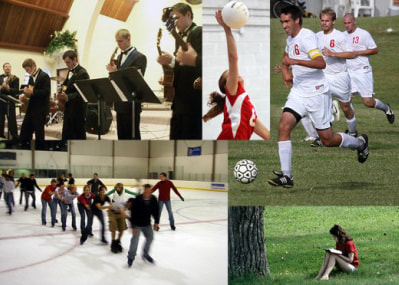
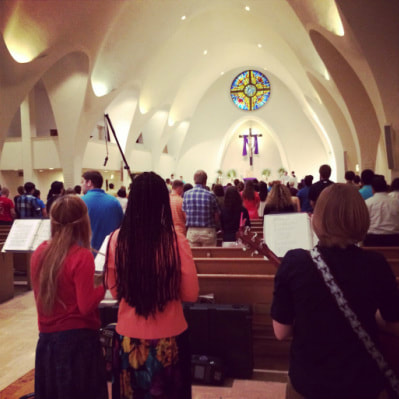



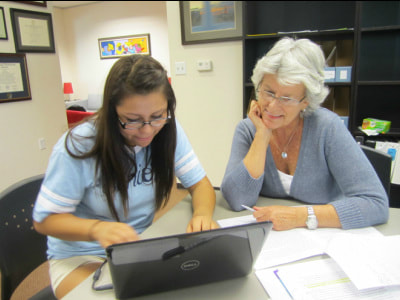
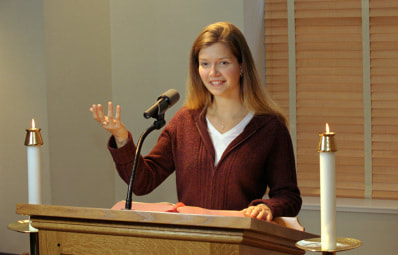
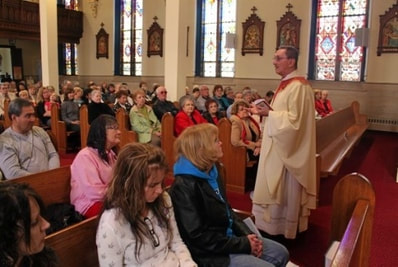
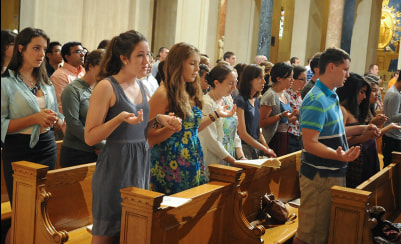

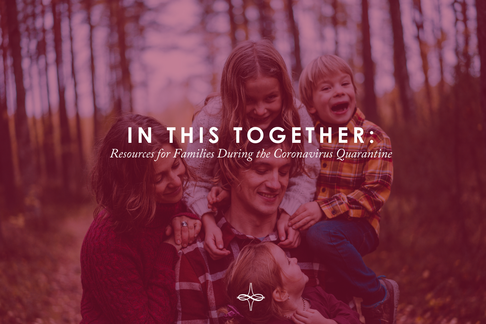




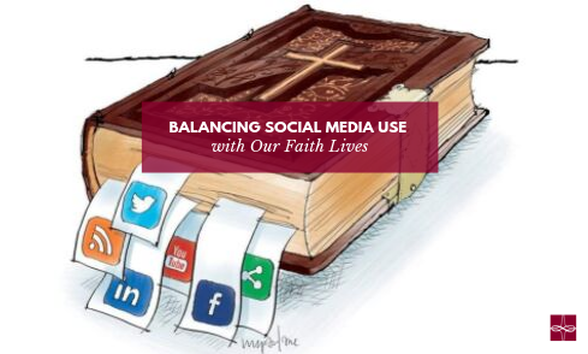

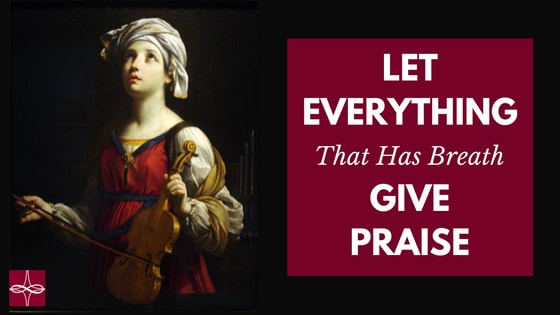

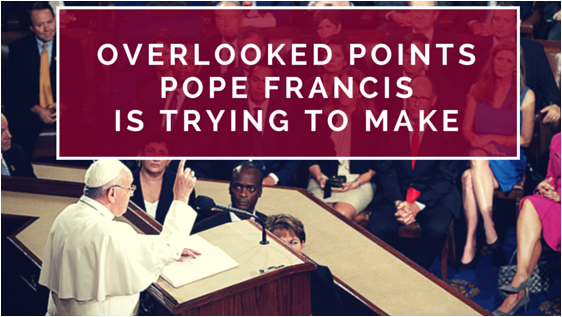



 RSS Feed
RSS Feed